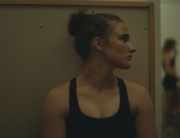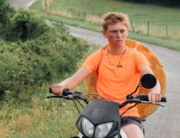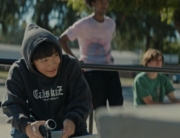French Canadian actress Charlotte Le Bon’s directorial debut feature is a softhearted yet somewhat stringent and bitter coming-of-age tale loosely based on a graphic novel by Bastien Vivès. It follows a 13-year-old also named Bastien (Joseph Engel) during an idyllic summer vacation in rural Quebec. Staying nearby his family’s lakeside tin-roofed cabin is the long-haired, disinterested, and somewhat sullen 16-year-old Chloé (Sara Montpetit), the daughter of a close friend of Bastien’s mother. The summer is often uneventful and idle: Bastien playing Switch or sitting on a floral armchair along the lake’s shore or watching cartoons with a juice box. At first, the quiet, awkward, and lanky Bastien is bashful around Chloé—scared to make conversation with her or take his shirt off for a swim—but despite their maturity gap, the two develop a fleeting summer affair.
Even though Falcon Lake is an outwardly mild and benign sexual awakening story, a lingering ominous ambiance hangs over the film. Captured by Kristof Brandl’s lush 16mm photography, the movie often moves in and out of light and dark—Bastien’s melancholic face behind a bonfire, lightning flashing within a night sky, the rustic cabin with its fluky electricity and overstuffed accoutrements (including foreboding Psycho and Nosferatu posters) lit by flashlights. The story, rooted in the fear of the unknown and the transitioning from childhood into adolescence, often touches upon death—the mythic (a legend of a child who supposedly drowned in the “wild part of the lake”) and the real. Seemingly off-the-cuff remarks, like wanting to “die before paying taxes,” are heavily symbolic.
There are moments where this symbolism is exquisitely rendered: Bastien and his young brother pretend a swampy area is instead smoldering lava. When Bastien and Chloé press their palms together, she notes “It’s like touching a corpse.” Wearing a sheet over his head, Bastien looks like a ghost or even the Virgin Mary. The aural landscape also provides an atmosphere of slight unease within a languid summer: a whirring table fan, gentle evening rainfall, howling winds, and a minimalist score by Shida Shahabi of hushed vocal tones and insistent chord progressions on a piano.
While the film dabbles into the relationships between death and change, it never feels leaden. It’s not a terribly original story, but Le Bon’s work with the specific setting and her actors, especially the non-showy turns by Montpetit and Engel, highlight the banality and clumsiness of youth with tender and memorable observations.

















Leave A Comment